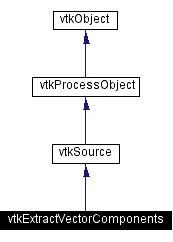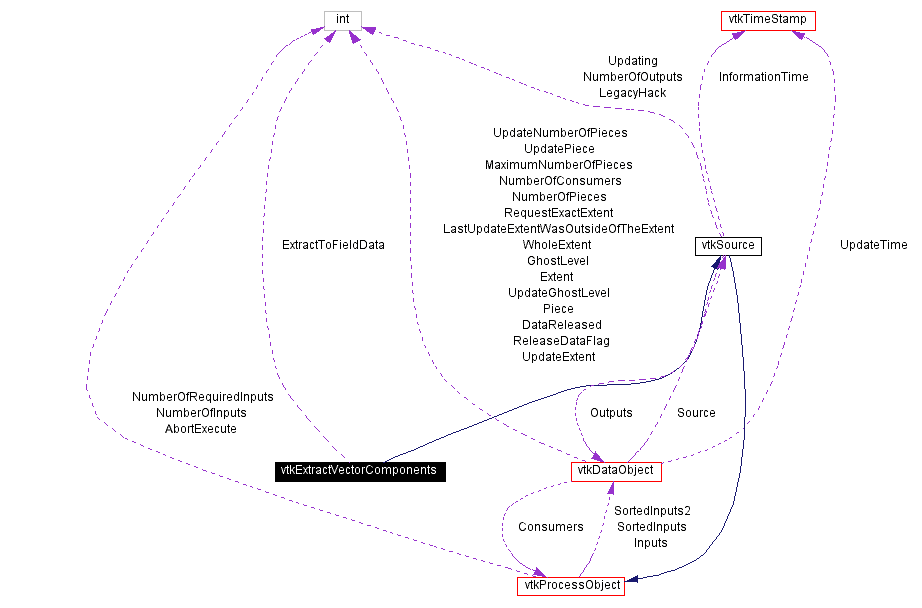Main Page Class Hierarchy Alphabetical List Compound List File List Compound Members File Members Related Pages
vtkExtractVectorComponents Class Reference
extract components of vector as separate scalars.
More...
#include <vtkExtractVectorComponents.h>
Inheritance diagram for vtkExtractVectorComponents:
 [legend]Collaboration diagram for vtkExtractVectorComponents:
[legend]Collaboration diagram for vtkExtractVectorComponents: [legend]List of all members.
[legend]List of all members.
Detailed Description
extract components of vector as separate scalars.
-
Date:
-
2001/10/11 13:37:02
-
Revision:
-
1.34
vtkExtractVectorComponents is a filter that extracts vector components as separate scalars. This is accomplished by creating three different outputs. Each output is the same as the input, except that the scalar values will be one of the three components of the vector. These can be found in the VxComponent, VyComponent, and VzComponent. Alternatively, if the ExtractToFieldData flag is set, the filter will put all the components in the field data. The first component will be the scalar and the others will be non-attribute arrays.
-
Warning:
-
This filter is unusual in that it creates multiple outputs. If you use the GetOutput() method, you will be retrieving the x vector component.
-
Tests:
-
vtkExtractVectorComponents (Tests)
Definition at line 70 of file vtkExtractVectorComponents.h.
Constructor & Destructor Documentation
| vtkExtractVectorComponents::vtkExtractVectorComponents |
( |
|
) |
[protected] |
|
| vtkExtractVectorComponents::~vtkExtractVectorComponents |
( |
|
) |
[protected] |
|
Member Function Documentation
| vtkExtractVectorComponents* vtkExtractVectorComponents::New |
( |
|
) |
[static] |
|
|
|
Instantiate object with no start, end, or progress methods.
Reimplemented from vtkSource. |
| virtual const char* vtkExtractVectorComponents::GetClassName |
( |
|
) |
[virtual] |
|
|
|
Return the class name as a string. This method is defined in all subclasses of vtkObject with the vtkTypeMacro found in vtkSetGet.h.
Reimplemented from vtkSource. |
| int vtkExtractVectorComponents::IsTypeOf |
( |
const char * |
type |
) |
[static] |
|
|
|
Return 1 if this class type is the same type of (or a subclass of) the named class. Returns 0 otherwise. This method works in combination with vtkTypeMacro found in vtkSetGet.h.
Reimplemented from vtkSource. |
| virtual int vtkExtractVectorComponents::IsA |
( |
const char * |
type |
) |
[virtual] |
|
|
|
Return 1 if this class is the same type of (or a subclass of) the named class. Returns 0 otherwise. This method works in combination with vtkTypeMacro found in vtkSetGet.h.
Reimplemented from vtkSource. |
| vtkExtractVectorComponents* vtkExtractVectorComponents::SafeDownCast |
( |
vtkObject * |
o |
) |
[static] |
|
|
|
Will cast the supplied object to vtkObject* is this is a safe operation (i.e., a safe downcast); otherwise NULL is returned. This method is defined in all subclasses of vtkObject with the vtkTypeMacro found in vtkSetGet.h.
Reimplemented from vtkSource. |
| void vtkExtractVectorComponents::PrintSelf |
( |
ostream & |
os, |
|
|
vtkIndent |
indent |
|
) |
[virtual] |
|
|
|
Methods invoked by print to print information about the object including superclasses. Typically not called by the user (use Print() instead) but used in the hierarchical print process to combine the output of several classes.
Reimplemented from vtkSource. |
| virtual void vtkExtractVectorComponents::SetInput |
( |
vtkDataSet * |
input |
) |
[virtual] |
|
|
|
Specify the input data or filter. |
| vtkDataSet* vtkExtractVectorComponents::GetInput |
( |
|
) |
|
|
|
|
Get the input data or filter. |
| vtkDataSet* vtkExtractVectorComponents::GetVxComponent |
( |
|
) |
|
|
|
|
Get the output dataset representing velocity x-component. If output is NULL then input hasn't been set, which is necessary for abstract objects. (Note: this method returns the same information as the GetOutput() method with an index of 0.) |
| vtkDataSet* vtkExtractVectorComponents::GetVyComponent |
( |
|
) |
|
|
|
|
Get the output dataset representing velocity y-component. If output is NULL then input hasn't been set, which is necessary for abstract objects. (Note: this method returns the same information as the GetOutput() method with an index of 1.) Note that if ExtractToFieldData is true, this output will be empty. |
| vtkDataSet* vtkExtractVectorComponents::GetVzComponent |
( |
|
) |
|
|
|
|
Get the output dataset representing velocity z-component. If output is NULL then input hasn't been set, which is necessary for abstract objects. (Note: this method returns the same information as the GetOutput() method with an index of 2.) Note that if ExtractToFieldData is true, this output will be empty. |
| vtkDataSet* vtkExtractVectorComponents::GetOutput |
( |
int |
i = 0 |
) |
|
|
|
|
Get the output dataset containing the indicated component. The component is specified by an index between (0,2) corresponding to the x, y, or z vector component. By default, the x component is extracted.
Reimplemented from vtkSource. |
| virtual void vtkExtractVectorComponents::SetExtractToFieldData |
( |
int |
|
) |
[virtual] |
|
|
|
Determines whether the vector components will be put in separate outputs or in the first output's field data |
| virtual int vtkExtractVectorComponents::GetExtractToFieldData |
( |
|
) |
[virtual] |
|
|
|
Determines whether the vector components will be put in separate outputs or in the first output's field data |
| virtual void vtkExtractVectorComponents::ExtractToFieldDataOn |
( |
|
) |
[virtual] |
|
|
|
Determines whether the vector components will be put in separate outputs or in the first output's field data |
| virtual void vtkExtractVectorComponents::ExtractToFieldDataOff |
( |
|
) |
[virtual] |
|
|
|
Determines whether the vector components will be put in separate outputs or in the first output's field data |
| void vtkExtractVectorComponents::Execute |
( |
|
) |
[protected, virtual] |
|
|
|
This method is the old style execute method
Reimplemented from vtkSource. |
Member Data Documentation
int vtkExtractVectorComponents::ExtractToFieldData [protected]
|
|
The documentation for this class was generated from the following file:
Generated on Thu Mar 28 14:29:24 2002 for VTK by
 1.2.11.1 written by Dimitri van Heesch,
© 1997-2001
1.2.11.1 written by Dimitri van Heesch,
© 1997-2001



 1.2.11.1 written by Dimitri van Heesch,
© 1997-2001
1.2.11.1 written by Dimitri van Heesch,
© 1997-2001